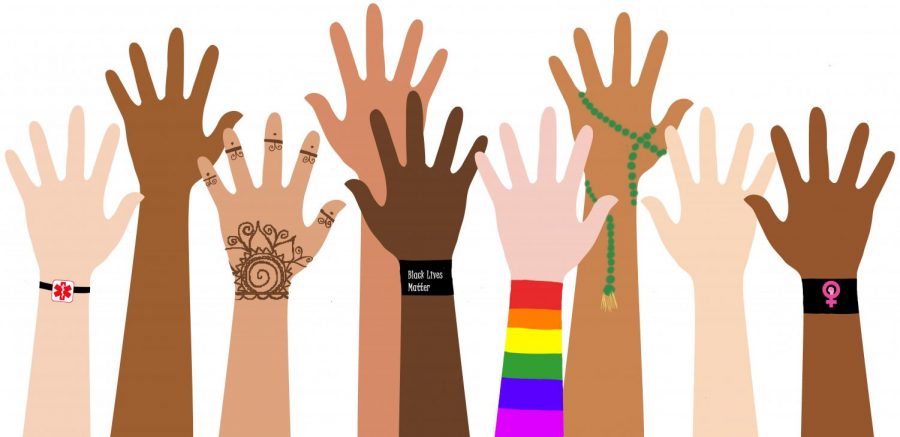Learning Outside the Bubble
12 Literature and Composition classes take a look at human rights.
Basic human rights are for everyone and the 12 Literature and Composition classes explore the importance of these laws.
Behind the second door to the left in the English hallway, English Teacher Lisa Knudson stands in front of her 12 Literature and Composition class. She pulls out a marker and writes the word “poverty” in black print. Then, she turns and begins a discussion with her class about the effects of poverty. The class proceeds to name issues: crime, disease, hunger, lack of education, discrimination. Knudson begins drawing lines to connect words; everything begins to piece together. Disease and lack of health care lead to death among the homeless. A web begins to form. The diagram comes into focus. Poverty ripples through our own nation. Our own state.
This was only the beginning. On the tail-end of the first semester, 12 LC classes began tackling all human rights. The teachers used the United States as their example presentation, poverty was their issue. Students were given regions or countries and were tasked with finding human rights violations. This unit and understanding can all be tied back to the signing of the Universal Declaration of Human Rights.
The signing began following the events of the Second World War, when nations from all across the globe came together on Dec. 10 1948 to form a declaration of human rights that would be applied around the world. The leader of the push for human rights was Eleanor Roosevelt, the wife of former president Franklin Delano Roosevelt. The document and the movement sparked more than 80 human rights declarations and treaties. This isn’t to say that all of the human rights are followed, or that all nations agreed with these rules, but the nations believed it was a step in the right direction.
To Knudson, human rights are rights that all are guaranteed, yet she stresses that this isn’t always the case — not every person has these rights. She believes that learning about human rights is important, especially for her students and anyone who steps foot in her classroom.
“We live in a bubble,” Knudson said. “I don’t think that people realize the terrible hardships that people from all over the world are going through. It’s important for me, as a teacher, to make sure that my students are equipped and understand that when they leave my classroom, because that is the only way we make the world better.”
Similar to Knudson, junior Ridaa Khan, the communications director of Troy High’s Model United Nations, believes the Troy community lives in a “bubble of privilege” and the United States resides in another. She believes that the community should take action.
“[Learning about human rights] can help prevent future cases of human rights infringement and it also helps raise awareness, which in turn helps create actual change in society and it creates actual action plans,” Khan said. “We don’t just have to witness the issues, we can help solve them too.”
Senior Nik Didocha finds human rights important because he said once they are gone, it’s hard to bring them back so protecting them is crucial. In his opinion, the best steps toward change is to contact government officials to make them aware because he noticed what the United States wasn’t doing this to assist the people in nations with numerous human rights issues.
“[I was surprised with] the lack of authority of the major world powers to actually do something to help, even if it is something basic it’s just giving aid,” Didocha said.
According to Freedom House, an organization that calculates the level of freedom in countries, in 2019 the United States received an aggregated score of 86 — the scale being 100 as the most free and zero deeming the least free. The United States, the land of the free, was surpassed by 51 other countries. Some on the high end include Finland, Norway and Sweden’s perfect score and the Netherlands’ 99. In the low single digits scores include Syria’s zero, South Sudan’s two, North Korea’s three and Saudi Arabia’s seven.
“In 2018, ‘Freedom in the World’ recorded the 13th consecutive year of decline in global freedom,” Freedom House said. “The reversal has spanned a variety of countries in every region, from long-standing democracies like the United States to consolidated authoritarian regimes like China and Russia. The overall losses are still shallow compared with the gains of the late 20th century, but the pattern is consistent and ominous. Democracy is in retreat.”
Knudson sees the issues within the borders, but sees more human rights violations elsewhere and wants her students to become more educated on regions around the world, as well as be thankful for what they have. She said her students are lucky and they should look out for those who don’t have a voice.
“I think that because we live in the U.S., we take [human rights] for granted,” Knudson said. “It’s everyday for us. Somebody has to speak up for those that are in need, and becoming more aware and becoming informed is how we make those situations possibly better.”
Your donation will support the student journalists of Troy High School - MI. Your contribution will allow us to print our work, purchase equipment and cover our annual website hosting costs.


